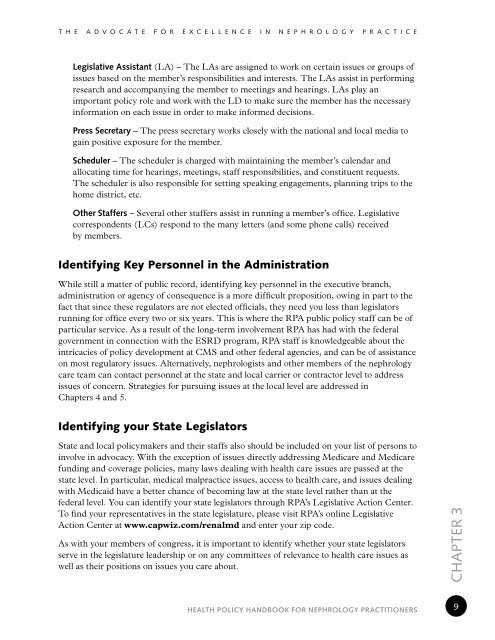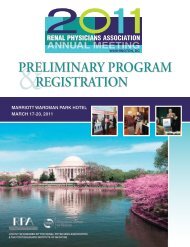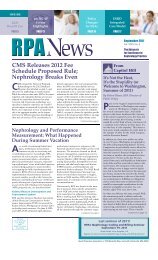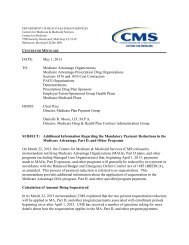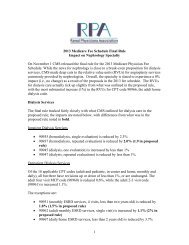The RPA Health Policy Handbook - Renal Physicians Association
The RPA Health Policy Handbook - Renal Physicians Association
The RPA Health Policy Handbook - Renal Physicians Association
Create successful ePaper yourself
Turn your PDF publications into a flip-book with our unique Google optimized e-Paper software.
T H e a D V o C a T e f o R e X C e l l e n C e I n n e P H R o l o G Y P R a C T I C e<br />
legislative assistant (LA) – <strong>The</strong> LAs are assigned to work on certain issues or groups of<br />
issues based on the member’s responsibilities and interests. <strong>The</strong> LAs assist in performing<br />
research and accompanying the member to meetings and hearings. LAs play an<br />
important policy role and work with the LD to make sure the member has the necessary<br />
information on each issue in order to make informed decisions.<br />
press secretary – <strong>The</strong> press secretary works closely with the national and local media to<br />
gain positive exposure for the member.<br />
scheduler – <strong>The</strong> scheduler is charged with maintaining the member’s calendar and<br />
allocating time for hearings, meetings, staff responsibilities, and constituent requests.<br />
<strong>The</strong> scheduler is also responsible for setting speaking engagements, planning trips to the<br />
home district, etc.<br />
other staffers – Several other staffers assist in running a member’s office. Legislative<br />
correspondents (LCs) respond to the many letters (and some phone calls) received<br />
by members.<br />
Identifying Key Personnel in the Administration<br />
While still a matter of public record, identifying key personnel in the executive branch,<br />
administration or agency of consequence is a more difficult proposition, owing in part to the<br />
fact that since these regulators are not elected officials, they need you less than legislators<br />
running for office every two or six years. This is where the <strong>RPA</strong> public policy staff can be of<br />
particular service. As a result of the long-term involvement <strong>RPA</strong> has had with the federal<br />
government in connection with the ESRD program, <strong>RPA</strong> staff is knowledgeable about the<br />
intricacies of policy development at CMS and other federal agencies, and can be of assistance<br />
on most regulatory issues. Alternatively, nephrologists and other members of the nephrology<br />
care team can contact personnel at the state and local carrier or contractor level to address<br />
issues of concern. Strategies for pursuing issues at the local level are addressed in<br />
Chapters 4 and 5.<br />
Identifying your State Legislators<br />
State and local policymakers and their staffs also should be included on your list of persons to<br />
involve in advocacy. With the exception of issues directly addressing Medicare and Medicare<br />
funding and coverage policies, many laws dealing with health care issues are passed at the<br />
state level. In particular, medical malpractice issues, access to health care, and issues dealing<br />
with Medicaid have a better chance of becoming law at the state level rather than at the<br />
federal level. You can identify your state legislators through <strong>RPA</strong>’s Legislative Action Center.<br />
To find your representatives in the state legislature, please visit <strong>RPA</strong>’s online Legislative<br />
Action Center at www.capwiz.com/renalmd and enter your zip code.<br />
As with your members of congress, it is important to identify whether your state legislators<br />
serve in the legislature leadership or on any committees of relevance to health care issues as<br />
well as their positions on issues you care about.<br />
health policy handbook for nephrology practitioners<br />
CHaPTeR 3<br />
9


